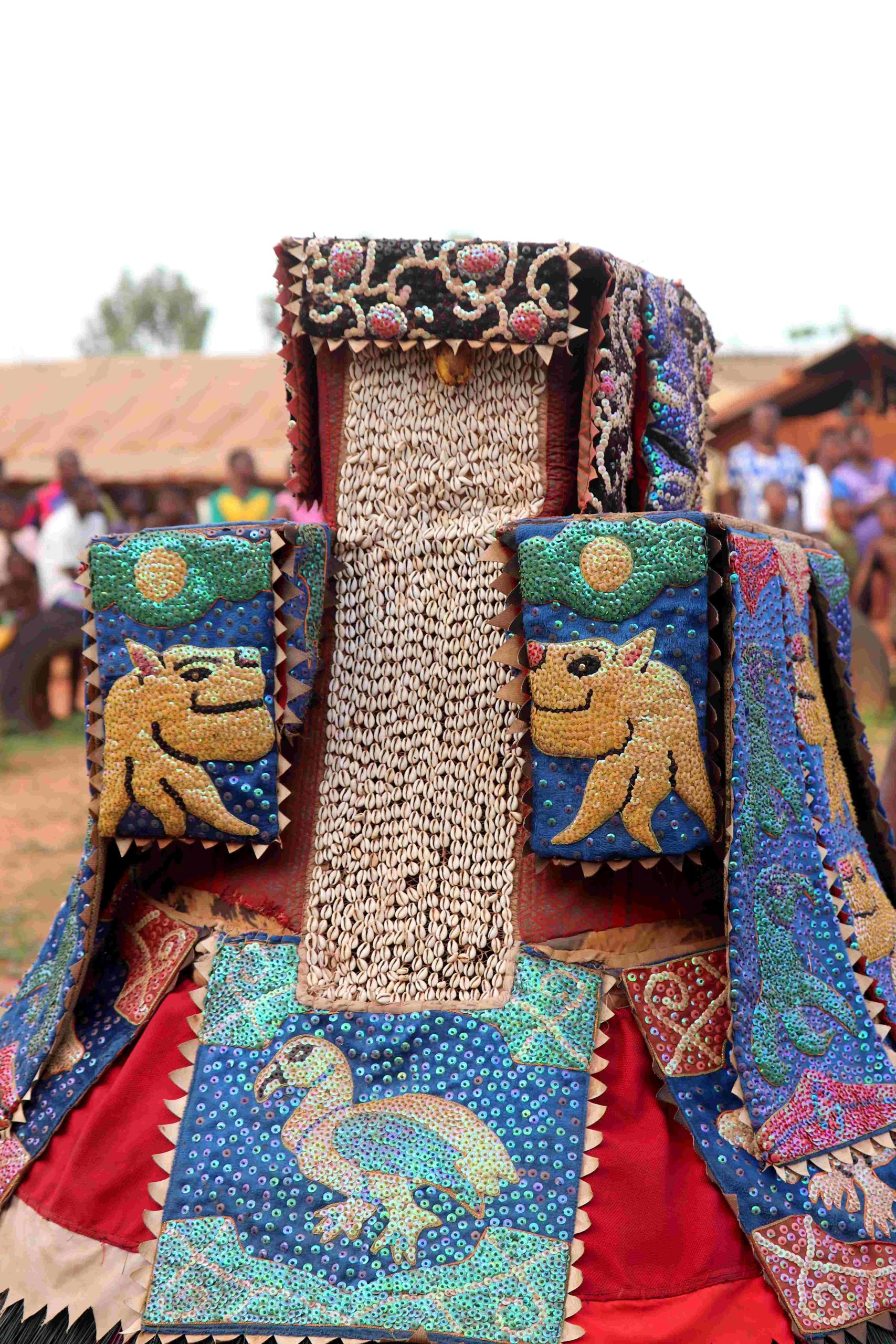We check out of the hotel early, today. There is quite a bit of driving to do. And then we spend an hour arranging sim cards for those who don’t have one yet. Could we have done this more efficiently, perhaps? But it gives my travel companion an hour time to say goodbye to all the local staff of the hotel, who, within 24 hours, all know her by name – although it is fair to say that quite a few other female group members were also addressed with ‘Sofia’, after all we all look the same.
We pass through Abomey, the ancient capital of the Dahomey kingdom. The palaces of two kings, father Guezo (1818-1858) and son Glele (1858-1889), have been added to UNESCO’s World Heritage Site list some time ago, although in reality they are little more than a series of adobe walls and buildings, distributed over outer courts and intermediate courts and inner courts, all to control access to the king. Out of respect to the king we have to enter bare foot, which is a painful exercise, not only because the sand is hot, but also because it contains quite a few courser parts, stones and shells and the like. And also out of respect, no pictures, of course. What it is with these people and photo paranoia? (I may not have shown all the respect asked for…).
The most remarkable buildings are the royal reception rooms, each now turned into museum, which have outer walls decorated with three rows of friezes, the lower one being the symbol of the king – a lion in the case of Glele, the son, a buffalo for his father Guezo -, a middle row with various scenes from war and daily life, which may well have been the same in Dahomey times, and an upper row depicting the weapons. The Dahomey kingdom, established in the 17th Century, was widely feared for their slave raids, attacking weaker neighbours and capturing everybody to sell to the Western traders. Well, not everybody, some capital destruction was occurring, as the king needed skulls, too, for instance to support his throne. In any case, the decline of the kingdom coincided with the abolishing of the slave trade.
The other interesting buildings were the tombs of the kings, allegedly made from mud mixed with the blood of 41 slaves, and animal blood and other exotic ingredients. On the side are the bones of the many animals sacrificed for the burial, or perhaps later ceremonies. The figure 41 also comes back (coincidentally?) in the number of concubines that, according to our guide, choose voluntary death by being buried alive, after the king died. Yet, this was less than half of the king’s women, easily numbering over a hundred, of which some apparently stayed a virgin for their entire life. Not easy, being a king and satisfying everybody.
Our next stop is one of the biggest fetish markets I have ever seen, with thousands of dead animal skulls – birds of different plumage, rats, goats, I don’t know what all -, skins, a few live snakes that are being kept in a plastic bag, and wooden fetishes. Sofia not joining this part of the excursion gave me the chance to buy a few, good pieces as far as I am concerned. Even though I bid only one-third of the asking price, I still feel I overpaid, given the immediate acceptance of my bid. But he, now we have Voodoo fetishes in our collection! Including one that gives me power!
We then continue to the village of Bopa, for another Voodoo dance, involving the Zangbetos – remember?, the raffia-dressed night watchmen, pseudo-police. Another frenzied drum band accompanies about ten Zangbeto spirits, who, one after the other, appear from the temple to swirls around – a bit like dervishes in Turkey – in front of the public, us on one side and the rest of the village on the other side along the road. Once again, the minders need to make sure that the swirling spirits don’t touch anybody, as touching the spirit’s cloth, or costume, is really bad for you. That they are real spirits and not just people inside the raffia cones, is proven several times over, when the cone, after much shaking and moving, is turned upside down, to reveal nothing else but a wooden head, or a coffin. By spraying the head, or coffin, with copious amounts of liquid – spirit of another kind, if you like -, the head moves its jaws, or the skeleton rights itself up, magically. Great trick, because when the cone is turned back and closed again, it walks off by its own means. You see? Real spirits! Magic!
As with most of the ceremonies, it takes a little long, but is entertaining enough. It means, though, that our audience with the President of Worldwide Voodoo, something like the Pope, but then for Voodoo, is late, it is almost dark. The President is impressively dressed, in black with a golden crown, but the answers to our questions, given through the President’s secretary, are disappointingly vague. He doesn’t know how many Voodoo adherents there are in the world, neither in how many countries it is practiced. Looks like the President of the World is mostly President of Benin, for Voodoo business.
Next: our last Voodoo dance
It also means that we will have to set up the tents in the dark, again – we are camping once more, tonight. Sofia and I had offered to cook, which became increasingly difficult, as despite several requests we kept on not stopping for shopping in a big market, so that in the end the ingredients were limited to a guacamole and a tuna salad with couscous. A bit frustrating, really, and our reputation in tatters! Planning is not the strength of this expedition, that much is clear.



















































